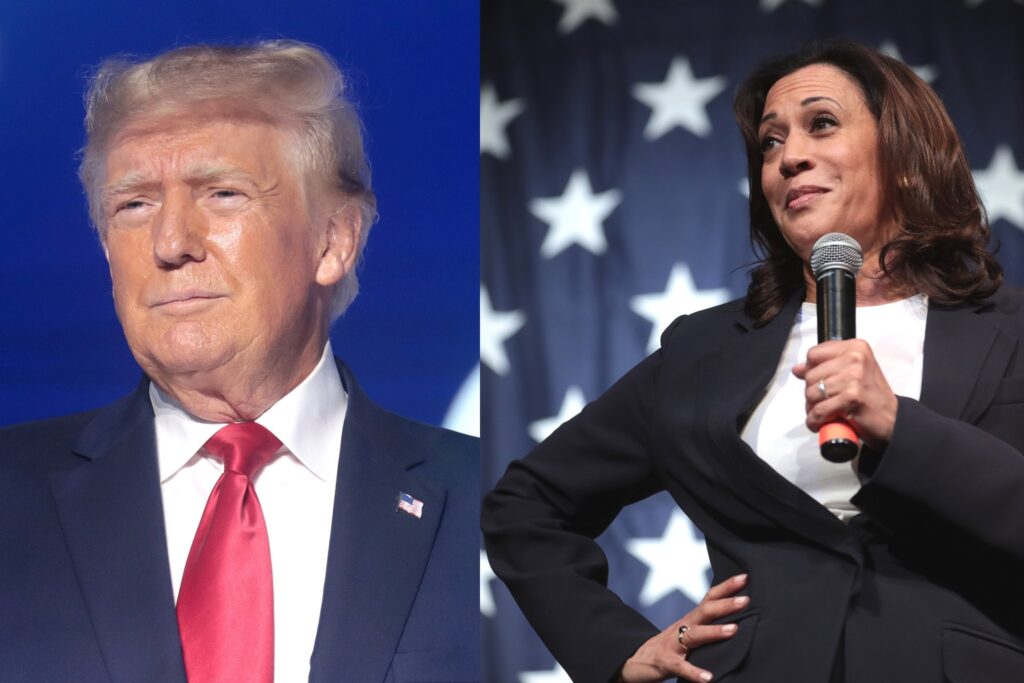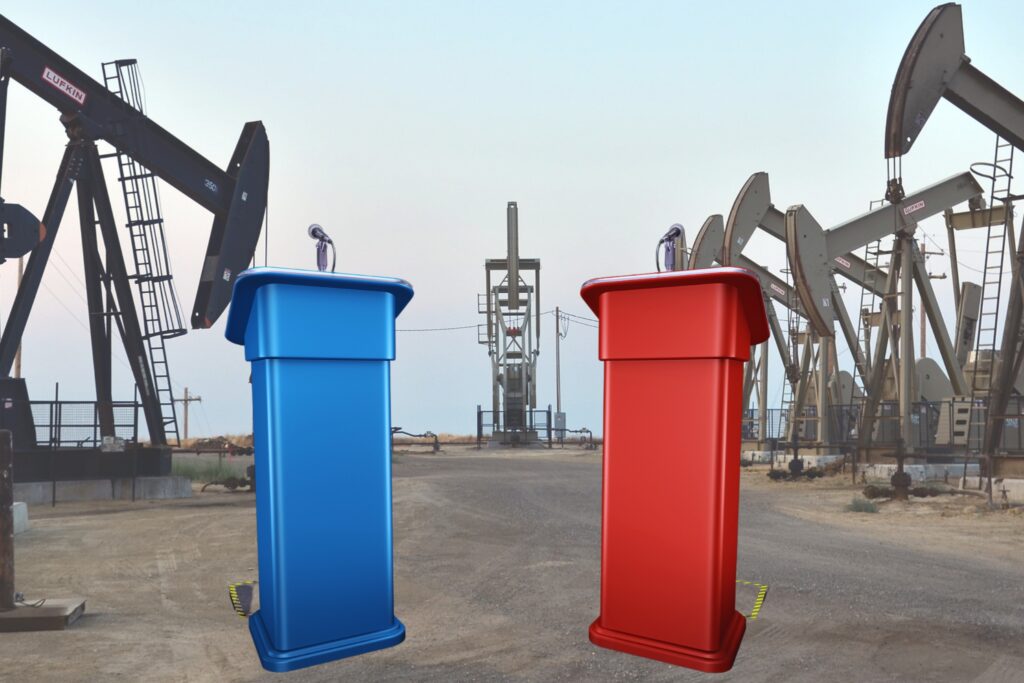The Harris-Trump Debate and Environmental Policy
In the ABC News debate, both candidates were asked directly, “What would you do to fight climate change?” Fracking and energy policy got most of the focus.

While abortion and immigration took center stage during last night’s presidential debate in Philadelphia, climate change and energy policy were referenced throughout the more than ninety minutes, in stark contrast to that Biden-Trump debate in June in which climate change was largely relegated to one question. From the very beginning of the debate, Trump attempted to denigrate Harris as a “Marxist” whose progressive policies are at odds with most voters, including her prior support for banning fracking (which she disavowed numerous times on the debate stage). Harris immediately sought to take credit for the successes of the Biden-Harris Administration, including the Inflation Reduction Act’s injection of federal funds to combat climate change and create clean energy jobs, while distancing herself from the Administration’s troubled record on inflation and immigration.
Harris could have gone even further by pillorying Trump for his recent statements promising to “rescind all unspent funds under the misnamed Inflation Reduction Act,” which includes approximately $700 billion in clean energy investments. The Inflation Reduction Act “has already spurred billions of dollars in planned U.S. manufacturing facilities across the country—the majority of which are in GOP-held congressional districts” per a recent Politico report. If Harris had taken the opportunity to call Trump out for threatening those job-creating projects, she could have cited the 18 GOP House members who expressed concern last month over a second Trump Administration “prematurely repealing energy tax credits, particularly those which were used to justify investments that already broke ground, [which] would undermine private investments and stop development that is already ongoing,” running the risk of “a worst-case scenario where we would have spent billions of taxpayer dollars and received next to nothing in return.” Although she left that arrow in her quiver, so to speak, it seems that she did so intentionally because she chose to denounce Trump directly and made very few references to the pushback Trump has received from members of his own party. This re-focusing on the Democratic Party’s own values and policy agenda is surprising after the DNC spent so much airtime highlighting how Trump has alienated many moderate Republicans and Independents with his divisive, extremist, and anti-democratic positions.
The first climate-related question came early in the debate, when ABC News moderator Linsey Davis questioned Harris about her shifting positions on banning fracking. Harris gave a now-familiar response to questions about fracking: “My values have not changed.” However, she paired that familiar talking point with a newfound eagerness to discuss the issue and a forthright recognition of the issue’s electoral importance as a key industry in the swingiest of swing states, saying “let’s talk about fracking because we’re here in Pennsylvania.” She clearly promised that she “will not ban fracking” and noted that she “ha[s] not banned fracking as Vice President of the United States, and, in fact, [she] was the tie-breaking vote on the Inflation Reduction Act, which opened new leases for fracking.” Interestingly, her newly-released “Issues” page on her campaign website similarly declares that she was “the tie-breaking vote to pass the Inflation Reduction Act, the largest investment in climate action in history” but doesn’t mention the fracking leases authorized by that statute, suggesting that she is now welcoming the opportunity to answer fracking-related questions but will not highlight the issue of her own volition. She then articulated her “both-and” approach to supporting some domestic fossil fuel operations while also supporting clean energy alternatives: “My position is that we have got to invest in diverse sources of energy so we reduce our reliance on foreign oil; we have had the largest increase in domestic oil production in history because of an approach that recognizes that we cannot over-rely on foreign oil.”
Trump responded by attacking Harris’s flip-flopping on fracking, saying “she’s been against it for 12 years” and that “this is a radical-left liberal that would do this” and calling into question her pledge to not ban fracking, saying “if she won the election, fracking in Pennsylvania will end on Day One.” Trump then ranted about his support for Big Oil, congratulating himself for getting “the oil business going like nobody has ever done before” before Biden took office and “prices were going up the roof . . . quadrupling and doubling.” Trump ended with some quintessentially Trumpian free-association fear-mongering: “Oil will be dead, fossil fuels will be dead, we’ll go back to windmills and solar where they need a whole desert to get some energy to come out.” Strangely, he then interjected, “By the way, I’m a big fan of solar,” perhaps predicting blowback from power players in the increasingly consolidated solar industry, often referred to as Big Solar. Throughout the debate, Trump returned unprompted to climate-related issues, mostly by doubting Harris’s promise of having reversed her position on banning fracking, as well as to claim that Biden and Harris “have destroyed our energy business,” which he used to pivot away from answering a question about his role in inciting the January 6th insurrection.
Before the debate, California Gov. Gavin Newsom said that Harris has “got to show the American people tonight that she’s not Joe Biden.” However, much of the climate-related discussion consisted of relitigating the environmental policy records of Joe Biden compared to Donald Trump, specifically with regard to pipelines. Trump brought up that Biden ended the Keystone XL pipeline in response to a question about world leaders’ attitudes toward Trump. Last month, Trump made the same attack on Biden during his interview with Elon Musk.
Later in the debate, Trump falsely claimed that he ended the Nord Stream 2 pipeline between Russia and Germany when, in fact, as one columnist in The Hill described, “the Trump legacy on Nord Stream 2” is “wasting years during which the project might have been stopped and then blaming his successor for his own failure.” Once again, Trump returned, unprompted, to the topic of the Nord Stream 2 pipeline to allege that “Biden put it back on Day One” and to criticize Biden’s approval of it as “weak” and “ineffective.” An ABC News fact-check provided more context on the falsity of Trump’s claim that he ended the Nord Stream 2 pipeline and Biden then resuscitated it:
It’s true that in 2019, Trump announced sanctions that halted the pipeline’s construction. But by that point, the pipeline was nearly complete with a majority of the project occurring under Trump’s presidency, according to a 2020 analysis by the Congressional Research Service. Biden later waived sanctions against the pipeline’s builder at the request of Germany in 2021, but reimposed penalties the following year as Russia invaded Ukraine.
Kamala Harris responded by saying, “First of all, it’s important to remind the former president you’re not running against Joe Biden, you’re running against me.” This rhetorical maneuver both absorbed some of Trump’s attacks and dovetailed nicely with her recent messaging strategy, which has energized the Democratic base with slogans like “We’re not going back” and “It’s time to turn the page.” She continued her ingenious and—so far—successful tactic of casting herself as a candidate of change, despite being the incumbent Vice President. Along similar lines, Harris countered Trump’s flagrant election denialism by reminding voters that “Donald Trump was fired by 81 million people.” Although her appropriation of his catchphrase from The Apprentice was predictable, it was effective in that it got under his skin, reminded voters of his reality-TV origins, and likely appealed to Harris-curious Republicans who recognize that Trumpism has been a losing strategy for the GOP, which has underperformed in every election cycle since 2016.

The second explicitly climate-related question also came from Linsey Davis, who framed the question as especially important to young voters. Davis prefaced her question by mentioning Trump’s prior comment that “we have to have clean air and clean water” and Harris’s statement calling climate change “an existential threat,” before asking, “What would you do to fight climate change?” Here is the full transcript of the candidates’ responses:
HARRIS: “The former President said that climate change is a hoax, and what we know is that it is very real. You ask anyone who lives in a state who has experienced these extreme weather occurrences who now is either being denied home insurance or whose is being jacked up. You ask anybody who has been the victim of what that means in terms of losing their home, having nowhere to go. We know that we can actually deal with this issue. The young people of America care deeply about this issue and I am proud that as Vice President over the last 4 years we have invested over $1 trillion in a clean energy economy while we have also increased domestic gas production to historic levels. We have created over 800,000 new manufacturing jobs while I have been Vice President. We have invested in clean energy to the point that we are opening up factories around the world. Donald Trump said he was going to create manufacturing jobs. He lost manufacturing jobs. I am also proud to have the endorsement of the United Auto Workers and Shawn Fain, who also know that part of building a clean energy economy includes investing in American-made products, American automobiles. It includes growing what we can do around American manufacturing and opening up auto plants, not closing them like happened under Donald Trump.”
TRUMP: “That didn’t happen under Donald Trump, let me tell you, they lost 10,000 manufacturing jobs this last month. It’s going, they’re all leaving, they’re building big auto plants in Mexico, in many cases owned by China. They’re building these massive plants and they think that they’re going to sell their cars into the United States because of these people. What they have given to China is unbelievable, but we’re not going to let that . . . we’ll put tariffs on those cars so they can’t come into our country because they will kill United Auto Workers and any auto worker, whether it’s in Detroit or South Carolina or any other place. What they’ve done to business and manufacturing in this country is horrible. We have nothing because they refuse, you know, Biden doesn’t go after the people because supposedly China paid him millions of dollars, he’s afraid to do it. Between him and his son, they get all this money from Ukraine, they get all this money from all of these different countries and then you wonder why is he so loyal to this one, that one, Ukraine, China, why is he? Why did he get three and a half million dollars from the mayor of Moscow’s wife? Why did she pay him three and a half million dollars? This is a crooked Administration and they’re selling our country down the tubes.”
Got all that?
Harris’s response was largely in line with her stump speech’s messaging on climate change, which touts the Biden-Harris Administration’s climate-related achievements in economic terms with an emphasis on clean manufacturing jobs. She certainly stayed true to her Californian roots by mentioning the increasing difficulty of acquiring homeowners’ insurance due to the effects of climate change, including the wildfires, floods, and coastal erosion to which we’re prone. Her shout-out to Shawn Fain and the United Auto Workers (and, by proxy, organized labor in general) was a shrewd appeal to the all-important Upper Midwest, including Michigan, where UAW is headquartered. The New York Times described Harris’s “$1 trillion” figure as misleading because “clean energy investment since 2021 has totaled roughly $700 billion” although “some experts expect the clean energy incentives to eventually help drive more than $1 trillion in private investment,” making this statement more of an oversimplification than an outright falsehood.
Speaking of outright falsehoods, Trump’s response was dominated by his baseless allegations that Joe Biden took bribes from foreign countries. The most surprising aspect of his answer was his unforced error in bringing up his plan to impose tariffs on imported goods, which polls poorly among swing voters and has been widely denounced by economists and financiers. Trump’s refusal to discuss the existential threat of climate change, coupled with his garbled, conspiracy-addled non-response, proves a point Harris made a few weeks ago in her speech at the DNC: “In many ways, Donald Trump is an unserious man, but the consequences of putting Donald Trump back in the White House are extremely serious.” In so many ways, Trump proved himself to be deeply unserious in this debate—especially with regard to environmental policy.
Reader Comments
3 Replies to “The Harris-Trump Debate and Environmental Policy”
Comments are closed.






Brennon,
Thanks for a good analysis and summary. Trump is not perfect but he is all we have. However unfortunate it may be, Trump is our only choice.
Come over to our side and have a good day.
A SHARE button would be appreciated so that this information can be more widely disseminated.
Hi Eric, we will look into this option! In the meantime, you can share by copying and pasting the url address where you would like to share it.